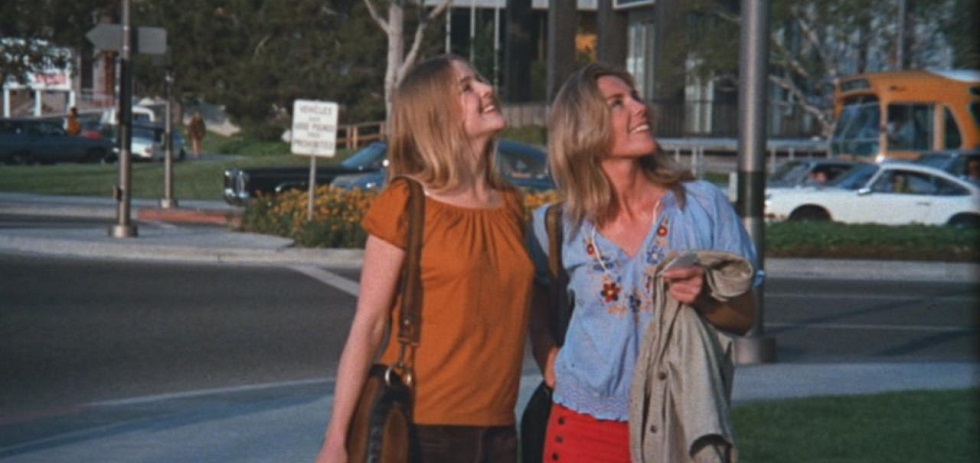Bonnie’s Kids is not a film that features a character named Bonnie, nor is it one where her absence lingers over everything in some symbolic, Bergman-esque fashion. Judging from an IMDB page stacked with exploitation standards, writer-director Arthur Marks would have thumbed his nose at the mere invocation of auteurship, nor cared if he had wound up with a largely middle-of-the-road affair for his efforts, which he has. Pull quotes are peppered over Glass Doll Films’ handsome Blu-Ray release that suggest savage thrills and spills, and it has some ably surprising moments, however they appear in a largely placid and agreeable crime narrative that won’t start any fires.
The kids of Bonnie’s Kids are Ellie (Tiffany Bolling) and Myra (Robin Mattson), two young women who you wouldn’t think to call kids if not for their stepfather (Leo Gordon) and his mates making a gross paternal fetish out of them. True to the vibe, the dad smacks Myra around and then tries to have his way with her, only for Ellie to arrive and put buckshot through his chest. Newly empowered, they hit the road and eventually wind up in El Paso, Texas to shack up with their wealthy Uncle Ben (Scott Brady). As they fill out their new digs and Ellie starts a titillating career in modelling, a private detective named Larry (Scott Sandor) is hired by two mysterious smooth-talkers (Alex Rocco, Timothy Brown) to deliver a package in a rural town. He arrives to find Ellie as his contact at the motel she’s gone to for a holiday, and a briefcase full of cash as their mark. The two quickly wind up in each others’ affection and plot on how to take the money and run, while Myra stays at their uncle’s manor waiting for Ellie to take them to a better life. With her being so strangely absent from the main proceedings, which in themselves feel like a cut-rate Bonnie and Clyde, it’s a fair guess that Marks is hashing out a screenplay in tune with location permits and actor schedules. In any case, story cohesion is obviously not a big concern.
As for where the real emphasis lies, there’s enough exaggerated sex and bloody violence to give drive-in and cult-dwelling audiences their money’s worth. Moving beyond those fleeting surface pleasures provides a study in contrasts that are curious for such a sleazy picture: a folk theme song underscoring two women who have just murdered their last caretaker (Bonnie is long dead when we meet them), or the oddly breezy caper feel of the final third, which off-sets Ellie and Larry’s destructive romance with quirky support performances, particularly from Max Showalter as a randy salesman. Those touches seem intentional and not overtly comedic, but the opposite feels certainly true with the shoddy line readings and blunt misogyny peppered throughout, as well as a absurdly mean-spirited end to a Myra sub-plot involving Uncle Ben’s secretly-lesbian housewife (played by Lenore Stevens). “Best” of all are the ham-fisted attempts at co-opting black culture. “They don’t make you sit at the back of the bus!” Ellie says to Brown’s character. “We’ve got black power in here!” the latter says when watching his friends box at the gym. “Mmm-hmmm,” a black actress is mercifully spared from saying when slow-nodding after Ellie’s Harry Belafonte name drop in a job interview. For all the varying levels of irony and amusement, these moments are united by that seat-of-the-pants feel that has unhinged the narrative in the first place, and sooner inspire pity than offense.
The question then becomes if this is worth nabbing as a home-release curio. The transfer looks fine enough, only noticeably hindered by murky night scenes, and there’s an impressive slate of commentaries and interviews with Marks, Bolling and Sandor, with Marks’ acting as a genteel introduction to the American exploitation market and Sandor’s anecdotes running feature-length. It’s just that the story and aesthetic of Kids are nothing to write about once all the momentary audaciousness makes its exit. It’s weak to qualify the overall result with conditional statements like “if you’re a fan of…” or “when you’re in the mood for…”, but such dry-well circumstances might be the best hope Bonnie’s Kids has for hooking any kind of hold in today’s world. It’s surprisingly breezy and sometimes as fun as you would hope, but never too much.

